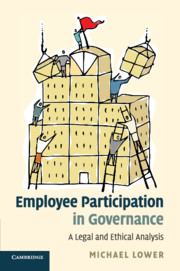Book contents
- Frontmatter
- Contents
- Acknowledgements
- Tables of legal instruments
- 1 Introduction
- 2 Catholic Social Thought: nature, sources and core principles and values
- 3 Catholic Social Thought and work
- 4 Catholic Social Thought, private property and markets
- 5 The corporation
- 6 The firm and society
- 7 Employee participation in corporate governance: an ethical analysis
- 8 Corporate Governance in the United Kingdom
- 9 Labour law and employee participation
- 10 Employee participation and EU corporate governance
- 11 Conclusion
- Bibliography
- Index
9 - Labour law and employee participation
Published online by Cambridge University Press: 05 October 2010
- Frontmatter
- Contents
- Acknowledgements
- Tables of legal instruments
- 1 Introduction
- 2 Catholic Social Thought: nature, sources and core principles and values
- 3 Catholic Social Thought and work
- 4 Catholic Social Thought, private property and markets
- 5 The corporation
- 6 The firm and society
- 7 Employee participation in corporate governance: an ethical analysis
- 8 Corporate Governance in the United Kingdom
- 9 Labour law and employee participation
- 10 Employee participation and EU corporate governance
- 11 Conclusion
- Bibliography
- Index
Summary
Introduction
In the previous chapter we saw that British company law and corporate governance are inspired by the shareholder value principle. The corporation, technically distinct from its shareholders, is seen as existing principally to promote their interests. The board is required to take the advancement of shareholder interests as its principal decision-making criterion and is accountable to shareholders. Greater dialogue between the board and shareholders, especially institutional shareholders, is a major policy goal.
The increasing sophistication of corporate governance mechanisms is clearly welcome to the extent that it truly leads to well-run businesses that meet the needs of their customers or clients at the same time as they promote the relevant interests of shareholders and employees. But where are the mechanisms that would allow employees both to play their part in promoting the well-being of the business and to protect their own reasonable interests?
Serious engagement with the possibility of mandatory employee participation on the corporate board came to an end by the late 1970s. From then on, it has been taken for granted in the UK that company law and corporate governance belong to the shareholder. Employees, their interests and mechanisms for participation have been hived off into a separate labour law compartment. This chapter looks at the contributions made by labour law to the search for institutions that facilitate employee participation in governance.
- Type
- Chapter
- Information
- Employee Participation in GovernanceA Legal and Ethical Analysis, pp. 149 - 169Publisher: Cambridge University PressPrint publication year: 2010



